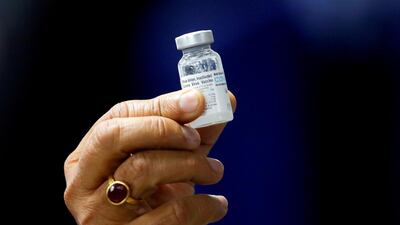Oman’s land borders will remain closed until February 1 to limit the spread of Covid-19, the sultanate’s state news agency said on Sunday.
The country’s coronavirus emergency committee closed its borders last week, citing concerns about the new virus variants.
Egypt will begin Covid-19 vaccinations on Sunday, beginning with medical staff, President Abdel-Fattah El Sisi said.
People above the age of 65 and those with chronic diseases are next in line to receive the vaccine. Together with health workers, these three categories constitute about 20.5 million people, according to official data.
Egypt received its first shipment of 100,000 doses of the Sinopharm vaccine on December 10. The finance ministry said another 20 million doses had been ordered.
The country will also receive 40 million vials via the Gavi vaccine alliance, enough for 20 million people or 20 per cent of its 100 million population, its health minister said last week.
Preparations for a Covid-19 immunisation campaign are also under way in Morocco, which received two million doses of AstraZeneca’s vaccine on Friday.
Morocco is the first African country to have a large enough shipment to start a free, nationwide immunisation programme.
It arrived on a Royal Air Maroc flight from India, which began exporting the vaccine, developed in conjunction with Oxford University, to middle and lower-income countries this week.
Morocco’s free vaccination campaign will start next week. Health workers will be immunised first, followed by public-sector workers, teachers and the elderly in areas with higher infections, the health ministry said.
About 3,000 vaccination centres have been set up, and mobile clinics will also be used to deliver doses in hard-to-reach areas.
The capital city of Rabat has also placed orders for 66 million doses, of which 25 million will be supplied by AstraZeneca – for which it has deals with both Serum Institute of India and Russia’s R-Pharm. The remainder will come from Sinopharm.
Morocco expects to receive its first vaccine batch from the Chinese company on January 27.
Turkish Health Minister Fahrettin Koca said 6.5 million doses of the vaccine made by Sinovac, also Chinese, will arrive in the country on Monday, the first of two planned shipments.
Three million doses of the CoronaVac have already arrived and 10 million more doses were expected in total in Turkey’s second consignment from Sinovac Biotech.
Dr Koca said the vaccines would be delivered in batches between December and February.
About 600,000 people were immunised in only two days when the vaccine programme began in mid-January.
Turkey also signed an agreement on Saturday with Russian sovereign wealth fund RDIF on production of its Sputnik V vaccine against Covid-19.
It said it had begun transferring the production technology to Turkey, Russia’s Interfax news agency reported.
Turkey is also in talks to increase the amount of coronavirus vaccines from Pfizer and BioNTech, from the initial one million doses, Sozcu newspaper quoted Mr Koca as saying.

